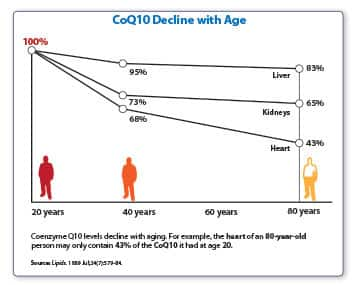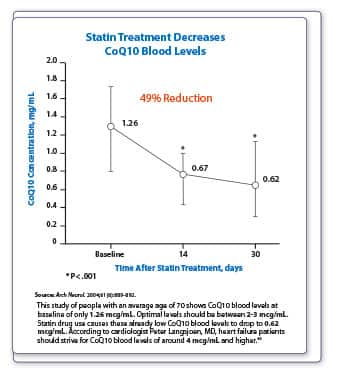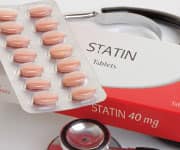Life Extension Magazine®
Life Extension® informed readers about coenzyme Q10 (CoQ10) in 1983.
Back in those early years, Americans did not know about CoQ10 even though it was widely prescribed in Japan to treat heart failure.
As clinical data mount about the ability of CoQ10 to improve heart, brain, and kidney function,1-5 it has become a popular dietary supplement in the United States.
New findings reveal improved bone density,6,7 reduced inflammation,5,8 and protection against diabetic complications.9,10
But not everyone is garnering these benefits.
With age, the body’s ability to fully utilize most commercial sources of CoQ10 (ubiquinone) diminishes.
When using the ubiquinol form, more CoQ10 is absorbed and made bioavailable to tissues throughout the body.
In younger people, CoQ10 is abundantly produced naturally.
With age and/or use of statin drugs, internal production of coenzyme Q10 plummets. The adverse consequence is systemic cellular energy depletion.
Supplementation with the ubiquinol form of CoQ10 can restore youthful CoQ10 blood levels and maximize its health-promoting effects.
What is Coenzyme Q10?

Coenzyme Q10 is found in every cell in our bodies. It’s located in the energy generators of our cells called the mitochondria.
As CoQ10 declines with aging and use of statin drugs, cell energy production falls, resulting in impaired organ function.
CoQ10 helps protect LDL from oxidation that contributes to atherosclerosis.11
Small amounts of CoQ10 (about 3 mg to 6 mg) can be acquired from meat and fish.12 To achieve benefits identified in human studies, doses of 100 mg a day and higher are needed.
Ubiquinol Vs. Ubiquinone
Ubiquinol and ubiquinone are two forms of CoQ10, but they have different characteristics.
Ubiquinone is the oxidized form of CoQ10 found in most commercial supplements. When ubiquinone is ingested, it must first be converted in the body to the active ubiquinol form.13
Ubiquinol , on the other hand, is readily available and highly absorbable for immediate use by cells. One study showed that ubiquinol supplementation increased CoQ10 blood levels by nearly five times from baseline.14
This means that ubiquinol is more efficient at increasing plasma levels of CoQ10 than ubiquinone.
Ubiquinol also penetrates into diverse tissues in the body.15,16 This includes crossing the blood-brain barrier to help energize brain cells.
In healthy, younger individuals, ubiquinol makes up at least 95% of all the CoQ10 in the plasma.17,18
In the elderly, particularly those with chronic disease, the percentage of the oxidized ubiquinone form of CoQ10 increases, leaving less ubiquinol.19
For aging people seeking higher CoQ10 bioavailability, ubiquinol is the preferred choice.
CoQ10 and Heart Health

Doctors who prescribe statin drugs to lower cholesterol often recommend that patients increase their intake of coenzyme Q10 during treatment.
There are two reasons: Statins decrease levels of CoQ10 in the body,20-25 and supplementation may help reduce some side effects of statins, like muscle soreness and liver damage.25-28
Beyond those beneficial effects, CoQ10 also supports cardiovascular health.1,2,13,29-33
In patients treated with statins for high cholesterol, studies have demonstrated that adding coenzyme Q10 (200 mg per day) in conjunction with fish oil (1,560 mg EPA/ 465 mg DHA) significantly reduced blood pressure, markers of inflammation, and lipid levels.30
Even without the use of a statin drug, coenzyme Q10 alone (120 mg daily) decreased LDL (“bad”) cholesterol by6.5% and lowered blood pressure in a recent study.13
Studies have also shown that coenzyme Q10 can benefit patients suffering from heart failure.
In a placebo-controlled study of heart failure patients, the group supplementing with CoQ10 had improved exercise capacity, decreased occurrence of cardiac-related events—and a significantly reduced, overall cardiac-related mortality.1,2
In 2018, researchers analyzed patients many years after supplementation with coenzyme Q10 and selenium. They found that those who had been treated continued to exhibit a significant reduction in risk for cardiovascular-related death 12 years later.29
What you need to know
- Coenzyme Q10 (CoQ10) is an important compound required for the processes that supply energy to cells and to protect from the damaging effects of free radicals.
- In addition to reducing side effects of cholesterol-lowering statin drugs, CoQ10 has been linked to protection from cardiovascular disease, neurological conditions, age-related bone loss, metabolic disorders like obesity and diabetes, and more.
- There are two forms of CoQ10: ubiquinol and ubiquinone. Studies have shown that ubiquinol is more easily absorbed, making it the preferred type in supplements.
- Supplementation with 100 mg to 400 mg per day of ubiquinol CoQ10 is safe and has been associated with health benefits in various human studies. Higher doses (400 mg/day) are often prescribed by cardiologists for heart failure patients.
Brain Benefits
Coenzyme Q10 has been found to offer several benefits to the brain and nervous system.3,4,34-37
In rats exposed to traumatic brain injury, CoQ10 demonstrates the ability to reduce the severity of brain-cell damage.36 Rodent models of stroke show that CoQ10 lessens the damage seen in the brain and reduces markers of oxidative stress, inflammation, and cell death in affected tissues.34,35
In animal models of Parkinson’s disease, CoQ10 leads to improvements on behavioral tests and slows the progression of the disease.38,39
In cell and mouse models of Alzheimer’s disease, CoQ10 was found to improve memory and limit the damage caused by amyloid, a harmful protein that is implicated in the deterioration of brain function.40,41
Human studies have demonstrated brain-health benefits of coenzyme Q10. For example, a study of migraine sufferers who supplemented with 100 mg to 400 mg per day of CoQ10 showed clinical improvement, including decreased frequency, severity, and duration of migraine haedaches.3,4
Shilajit Boosts the Actions of CoQ10
Shilajit is a substance arising from the decomposition of various plants. It has been widely used for centuries in traditional Indian medicine to promote physical and mental health.
Shilajit contains a wide mix of minerals and organic compounds. Among these are compounds whose actions complement those of coenzyme Q10.
Experimental studies have shown that CoQ10 and shilajit work together to boost cellular energy production more than either nutrient alone.54,55
Compounds in shilajit also stabilize CoQ10 so that it is not broken down and can continue to work longer.54,56
Fulvic acid, one of the principal components of shilajit, has promising potential for chronic inflammatory diseases. Fulvic acid directly stimulates energy production by mitochondria, further augmenting the effects of CoQ10.57
Metabolic Health

While CoQ10 is best known for its impact on cellular energy and heart health, research shows that it also plays a role in maintaining metabolic health.
Plasma levels of ubiquinol are often reduced in patients with type II diabetes.42 Experimental and clinical evidence suggests that supplementation with coenzyme Q10 helps improve glucose control, insulin, and fat metabolism.9,42-46
A recent review of 14 different trials, including close to 700 overweight/obese diabetic subjects, showed that supplementation with CoQ10 reduced levels of triglycerides, glucose, fasting insulin, and hemoglobin A1c.44
CoQ10 also has favorable effects on metabolic health and markers of inflammation in people suffering from kidney disease, a common diabetic complication.9,10
Better Bones
Aging often leads to osteoporosis, a decline in bone density that increases the risk for fractures. Osteoporosis is a major contributor to disability and death in the elderly.47
Healthy bones require constant remodeling, a balance between bone breakdown and new bone growth. If the balance leans towards more breakdown and less new bone formation, bones grow thin and fragile.
In preclinical studies, coenzyme Q10 demonstrated the ability to prevent age-related decline in bone density, decreasing breakdown of bone while boosting new bone formation and stimulating the growth of bone-forming osteoblast cells.6,7
Other Benefits

Researchers are constantly exploring potential new uses for CoQ10.
Recent evidence suggests that it enhances the sensitivity to chemotherapy and radiation of human glioblastoma cells (a deadly form of brain cancer). 48 CoQ10 may even inhibit the activity of some cells associated with the development of pancreatic cancer.49
CoQ10 has also been found to decrease markers of chronic inflammation. As people age, inflammatory markers increase and contribute to a host of degenerative disorders. 5,8,50
Studies show that CoQ10 helps increase levels of beneficial hormones that decline with age, such as insulin-like growth factor,51 and decrease compounds associated with inflammation, such as C-reactive protein and tumor necrosis factor.52 This makes it a powerful supplement for anti-aging and disease risk- reduction strategies.
A recent, systematic analysis of clinical trials suggests that CoQ10 supplementation could be effective at alleviating fatigue.53
Statin Drugs Lower Coenzyme Q10 Levels
Roughly 30% of all adults in the U.S. take prescription statin drugs to lower levels of LDL cholesterol, such as atorvastatin (Lipitor®), simvastatin (Zocor®), and pravastatin (Pravachol®).58
But long-term use of these drugs has a risk: low levels of coenzyme Q10.59,60 The action statins take to block an enzyme that increases cholesterol production also blocks production of CoQ10 in the body, leading to a deficiency.
As a result, many experts recommend that people taking statin medication increase their intake of CoQ10. Due to its superior bioavailability, ubiquinol can best replenish low levels of CoQ10.61
Summary
Coenzyme Q10 has been linked to better cardiovascular, neurological, metabolic, and bone health.
CoQ10 comes in two forms, ubiquinol and ubiquinone, but they’re not the same. Ubiquinol is the form responsible for its health benefits, and it’s more easily absorbed than ubiquinone.
While younger people can benefit from either form, maturing individuals should consider ubiquinol because their internal production of CoQ10 is so deficient.
The chart on this page shows how CoQ10 levels plummet in response to statin drug use. The chart also reveals that normal, aged people already have less-than-optimal CoQ10 blood levels.
Taking 100 mg and more of the ubiquinol form of coenzyme Q10 with a fatty meal can help older individuals lead a longer, healthier life.
If you have any questions on the scientific content of this article, please call a Life Extension® Wellness Specialist at 1-866-864-3027.
References
- Ayers J, Cook J, Koenig RA, et al. Recent Developments in the Role of Coenzyme Q10 for Coronary Heart Disease: a Systematic Review. Curr Atheroscler Rep. 2018 May 16;20(6):29.
- Lei L, Liu Y. Efficacy of coenzyme Q10 in patients with cardiac failure: a meta-analysis of clinical trials. BMC Cardiovasc Disord. 2017 Jul 24;17(1):196.
- Shoeibi A, Olfati N, Soltani Sabi M, et al. Effectiveness of coenzyme Q10 in prophylactic treatment of migraine headache: an open-label, add-on, controlled trial. Acta Neurol Belg. 2017 Mar;117(1):103-9.
- Dahri M, Tarighat-Esfanjani A, Asghari-Jafarabadi M, et al. Oral coenzyme Q10 supplementation in patients with migraine: Effects on clinical features and inflammatory markers. Nutr Neurosci. 2018 Jan 3:1-9.
- Hernandez-Camacho JD, Bernier M, Lopez-Lluch G, et al. Coenzyme Q10 Supplementation in Aging and Disease. Front Physiol. 2018;9:44.
- Zheng D, Cui C, Yu M, et al. Coenzyme Q10 promotes osteoblast proliferation and differentiation and protects against ovariectomy-induced osteoporosis. Mol Med Rep. 2018 Jan;17(1):400-7.
- Varela-Lopez A, Ochoa JJ, Llamas-Elvira JM, et al. Loss of Bone Mineral Density Associated with Age in Male Rats Fed on Sunflower Oil Is Avoided by Virgin Olive Oil Intake or Coenzyme Q Supplementation. Int J Mol Sci. 2017 Jun 29;18(7).
- Mazidi M, Kengne AP, Banach M, et al. Effects of coenzyme Q10 supplementation on plasma C-reactive protein concentrations: A systematic review and meta-analysis of randomized controlled trials. Pharmacol Res. 2018 Feb;128:130-6.
- Gholnari T, Aghadavod E, Soleimani A, et al. The Effects of Coenzyme Q10 Supplementation on Glucose Metabolism, Lipid Profiles, Inflammation, and Oxidative Stress in Patients With Diabetic Nephropathy: A Randomized, Double-Blind, Placebo-Controlled Trial. J Am Coll Nutr. 2018 Mar-Apr;37(3):188-93.
- Heidari A, Hamidi G, Soleimani A, et al. Effects of Coenzyme Q10 Supplementation on Gene Expressions Related to Insulin, Lipid, and Inflammation Pathways in Patients With Diabetic Nephropathy. Iran J Kidney Dis. 2018 Jan;12(1):14-21.
- Kumar A, Kaur H, Devi P, et al. Role of coenzyme Q10 (CoQ10) in cardiac disease, hypertension and Meniere-like syndrome. Pharmacol Ther. 2009 Dec;124(3):259-68.
- Pravst I, Zmitek K, Zmitek J. Coenzyme Q10 contents in foods and fortification strategies. Crit Rev Food Sci Nutr. 2010 Apr;50(4):269-80.
- Zhang P, Yang C, Guo H, et al. Treatment of coenzyme Q10 for 24 weeks improves lipid and glycemic profile in dyslipidemic individuals. J Clin Lipidol. 2018 Mar - Apr;12(2):417-27 e5.
- Langsjoen PH, Langsjoen AM. Comparison study of plasma coenzyme Q10 levels in healthy subjects supplemented with ubiquinol versus ubiquinone. Clin Pharmacol Drug Dev. 2014 Jan;3(1):13-7.
- Mitsui J, Koguchi K, Momose T, et al. Three-Year Follow-Up of High-Dose Ubiquinol Supplementation in a Case of Familial Multiple System Atrophy with Compound Heterozygous COQ2 Mutations. Cerebellum. 2017 Jun;16(3):664-72.
- Watanabe K, Nozaki S, Goto M, et al. PET imaging of (11)C-labeled coenzyme Q10: Comparison of biodistribution between [(11)C]ubiquinol-10 and [(11)C]ubiquinone-10. Biochem Biophys Res Commun. 2019 May 7;512(3):611-5.
- Tang PH, Miles MV, DeGrauw A, et al. HPLC analysis of reduced and oxidized coenzyme Q(10) in human plasma. Clin Chem. 2001 Feb;47(2):256-65.
- Yamamoto Y, Yamashita S. Plasma ratio of ubiquinol and ubiquinone as a marker of oxidative stress. Mol Aspects Med. 1997;18 Suppl:S79-84.
- Wada H, Goto H, Hagiwara S, et al. Redox status of coenzyme Q10 is associated with chronological age. J Am Geriatr Soc. 2007 Jul;55(7):1141-2.
- Ghirlanda G, Oradei A, Manto A, et al. Evidence of plasma CoQ10-lowering effect by HMG-CoA reductase inhibitors: a double-blind, placebo-controlled study. J Clin Pharmacol. 1993 Mar;33(3):226-9.
- Lamperti C, Naini AB, Lucchini V, et al. Muscle coenzyme Q10 level in statin-related myopathy. Arch Neurol. 2005 Nov;62(11):1709-12.
- Littarru GP, Langsjoen P. Coenzyme Q10 and statins: biochemical and clinical implications. Mitochondrion. 2007 Jun;7 Suppl:S168-74.
- Paiva H, Thelen KM, Van Coster R, et al. High-dose statins and skeletal muscle metabolism in humans: a randomized, controlled trial. Clin Pharmacol Ther. 2005 Jul;78(1):60-8.
- Rundek T, Naini A, Sacco R, et al. Atorvastatin decreases the coenzyme Q10 level in the blood of patients at risk for cardiovascular disease and stroke. Arch Neurol. 2004 Jun;61(6): 889-92.
- Deichmann R, Lavie C, Andrews S. Coenzyme q10 and statin-induced mitochondrial dysfunction. Ochsner J. 2010 Spring;10(1):16-21.
- Skarlovnik A, Janic M, Lunder M, et al. Coenzyme Q10 supplementation decreases statin-related mild-to-moderate muscle symptoms: a randomized clinical study. Med Sci Monit. 2014 Nov 6;20:2183-8.
- Littlefield N, Beckstrand RL, Luthy KE. Statins’ effect on plasma levels of Coenzyme Q10 and improvement in myopathy with supplementation. J Am Assoc Nurse Pract. 2014 Feb;26(2):85-90.
- Farrag SM, Hamzawy MA, El-Yamany MF, et al. Atorvastatin in nano-particulate formulation abates muscle and liver affliction when coalesced with coenzyme Q10 and/or vitamin E in hyperlipidemic rats. Life Sci. 2018 Jun 15;203:129-40.
- Alehagen U, Aaseth J, Alexander J, et al. Still reduced cardiovascular mortality 12 years after supplementation with selenium and coenzyme Q10 for four years: A validation of previous 10-year follow-up results of a prospective randomized double-blind placebo-controlled trial in elderly. PLoS One. 2018;13(4):e0193120.
- Toth S, Sajty M, Pekarova T, et al. Addition of omega-3 fatty acid and coenzyme Q10 to statin therapy in patients with combined dyslipidemia. J Basic Clin Physiol Pharmacol. 2017 Jul 26;28(4):327-36.
- Sharma A, Fonarow GC, Butler J, et al. Coenzyme Q10 and Heart Failure: A State-of-the-Art Review. Circ Heart Fail. 2016 Apr;9(4):e002639.
- DiNicolantonio JJ, Bhutani J, McCarty MF, et al. Coenzyme Q10 for the treatment of heart failure: a review of the literature. Open Heart . 2015;2(1):e000326.
- Fotino AD, Thompson-Paul AM, Bazzano LA. Effect of coenzyme Q(1)(0) supplementation on heart failure: a meta-analysis. Am J Clin Nutr. 2013 Feb;97(2):268-75.
- Abd El-Aal SA, Abd El-Fattah MA, El-Abhar HS. CoQ10 Augments Rosuvastatin Neuroprotective Effect in a Model of Global Ischemia via Inhibition of NF-kappaB/JNK3/Bax and Activation of Akt/FOXO3A/Bim Cues. Front Pharmacol. 2017;8:735.
- Nasoohi S, Simani L, Khodagholi F, et al. Coenzyme Q10 supplementation improves acute outcomes of stroke in rats pretreated with atorvastatin. Nutr Neurosci. 2019 Apr;22(4):264-72.
- Pierce JD, Gupte R, Thimmesch A, et al. Ubiquinol treatment for TBI in male rats: Effects on mitochondrial integrity, injury severity, and neurometabolism. J Neurosci Res. 2018 Jun;96(6):1080-92.
- Mousavinejad E, Ghaffari MA, Riahi F, et al. Coenzyme Q10 supplementation reduces oxidative stress and decreases antioxidant enzyme activity in children with autism spectrum disorders. Psychiatry Res. 2018 Jul;265:62-9.
- Attia HN, Maklad YA. Neuroprotective effects of coenzyme Q10 on paraquat-induced Parkinson’s disease in experimental animals. Behav Pharmacol. 2018 Feb;29(1):79-86.
- Gupta BK, Kumar S, Kaur H, et al. Attenuation of Oxidative Damage by Coenzyme Q10 Loaded Nanoemulsion Through Oral Route for the Management of Parkinson’s Disease. Rejuvenation Res. 2018 Jun;21(3):232-48.
- Li L, Xu D, Lin J, et al. Coenzyme Q10 attenuated beta-amyloid25-35-induced inflammatory responses in PC12 cells through regulation of the NF-kappaB signaling pathway. Brain Res Bull. 2017 May;131:192-8.
- Muthukumaran K, Kanwar A, Vegh C, et al. Ubisol-Q10 (a Nanomicellar Water-Soluble Formulation of CoQ10) Treatment Inhibits Alzheimer-Type Behavioral and Pathological Symptoms in a Double Transgenic Mouse (TgAPEswe, PSEN1dE9) Model of Alzheimer’s Disease. J Alzheimers Dis. 2018;61(1):221-36.
- Shen Q, Pierce JD. Supplementation of Coenzyme Q10 among Patients with Type 2 Diabetes Mellitus. Healthcare (Basel). 2015 May 21;3(2):296-309.
- Sun IO, Jin L, Jin J, et al. The effects of addition of coenzyme Q10 to metformin on sirolimus-induced diabetes mellitus. Korean J Intern Med. 2019 Mar;34(2):365-74.
- Huang H, Chi H, Liao D, et al. Effects of coenzyme Q10 on cardiovascular and metabolic biomarkers in overweight and obese patients with type 2 diabetes mellitus: a pooled analysis. Diabetes Metab Syndr Obes. 2018;11:875-86.
- Zhang SY, Yang KL, Zeng LT, et al. Effectiveness of Coenzyme Q10 Supplementation for Type 2 Diabetes Mellitus: A Systematic Review and Meta-Analysis. Int J Endocrinol. 2018;2018:6484839.
- Xu Z, Huo J, Ding X, et al. Coenzyme Q10 Improves Lipid Metabolism and Ameliorates Obesity by Regulating CaMKII-Mediated PDE4 Inhibition. Sci Rep. 2017 Aug 15;7(1):8253.
- Madureira MM, Ciconelli RM, Pereira RM. Quality of life measurements in patients with osteoporosis and fractures. Clinics (Sao Paulo). 2012 Nov;67(11):1315-20.
- Frontinan-Rubio J, Santiago-Mora RM, Nieva-Velasco CM, et al. Regulation of the oxidative balance with coenzyme Q10 sensitizes human glioblastoma cells to radiation and temozolomide. Radiother Oncol. 2018 Aug;128(2):236-44.
- Xue R, Yang J, Wu J, et al. Coenzyme Q10 inhibits the activation of pancreatic stellate cells through PI3K/AKT/mTOR signaling pathway. Oncotarget. 2017 Nov 3;8(54):92300-11.
- Fan L, Feng Y, Chen GC, et al. Effects of coenzyme Q10 supplementation on inflammatory markers: A systematic review and meta-analysis of randomized controlled trials. Pharmacol Res. 2017 May;119:128-36.
- Junnila RK, List EO, Berryman DE, et al. The GH/IGF-1 axis in ageing and longevity. Nat Rev Endocrinol. 2013 Jun;9(6):366-76.
- Alehagen U, Johansson P, Aaseth J, et al. Increase in insulin-like growth factor 1 (IGF-1) and insulin-like growth factor binding protein 1 after supplementation with selenium and coenzyme Q10. A prospective randomized double-blind placebo-controlled trial among elderly Swedish citizens. PLoS One. 2017;12(6):e0178614.
- Mehrabani S, Askari G, Miraghajani M, et al. Effect of coenzyme Q10 supplementation on fatigue: A systematic review of interventional studies. Complement Ther Med. 2019 Apr;43:181-7.
- Bhattacharyya S, Pal D, Banerjee D, et al. Shilajit dibenzo—pyrones: Mitochondria targeted antioxidants. Pharmacologyonline. 2009;2:690-8.
- Bhattacharyya S, Pal D, Gupta AK, et al. Beneficial effect of processed shilajit on swimming exercise induced impaired energy status of mice. Pharmacologyonline. 2009;1:817-25.
- Islam A, Ghosh R, Banerjee D, et al. Biotransformation of 3-hydroxydibenzo—pyrone into 3,8 dihydroxydibenzo—pyrone and aminoacyl conjugates by Aspergillus niger isolated from native shilajit. Electronic Journal of Biotechnology. 2008;1115 06.
- Visser SA. Effect of humic substances on mitochondrial respiration and oxidative phosphorylation. Sci Total Environ. 1987 Apr;62:347-54.
- Salami JA, Warraich H, Valero-Elizondo J, et al. National Trends in Statin Use and Expenditures in the US Adult Population From 2002 to 2013: Insights From the Medical Expenditure Panel Survey. JAMA Cardiol. 2017 Jan 1;2(1): 56-65.
- Mortensen SA, Leth A, Agner E, et al. Dose-related decrease of serum coenzyme Q10 during treatment with HMG-CoA reductase inhibitors. Mol Aspects Med. 1997;18 Suppl:S137-44.
- Passi S, Stancato A, Aleo E, et al. Statins lower plasma and lymphocyte ubiquinol/ubiquinone without affecting other antioxidants and PUFA. Biofactors. 2003;18(1-4):113-24.
- Evans M, Baisley J, Barss S, et al. A randomized, double-blind trial on the bioavailability of two CoQ10 formulations. Journal of Functional Foods. 2009 2009/01/01/;1(1):65-73.
- Available at: Available at: https://www.lifeextension.com/magazine/2008/2/conventional-coq10-fails-severe-heart-disease-patients. Accessed August 15, 2019.

